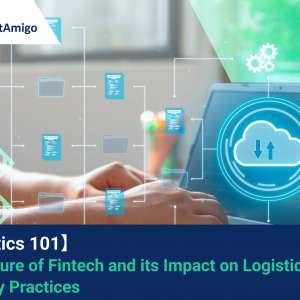Author Name: Tiffany Lee – Marketing Analyst at FreightAmigo
In the fast-paced world of e-commerce and omnichannel retail, last-mile delivery and logistics have become critical components of the supply chain. As consumer expectations continue to rise, businesses are seeking innovative solutions to optimize and revolutionize this final stage of the delivery process. In recent years, the emergence of financial technology, or FinTech, has provided a catalyst for transformative change in the last-mile delivery industry. By leveraging advanced technologies, such as artificial intelligence, robotics, and the Internet of Things (IoT), FinTech companies are reshaping the way goods are transported and delivered to end consumers.
Want To Compare The Best Express, Air Freight, Sea Freight, Rail Freight & Trucking Rates So As To Have Better Control On Cost?
The Impact of FinTech on Last-Mile Delivery
The Rise of E-commerce and Changing Consumer Habits
The rise of e-commerce has fundamentally changed the way consumers shop, creating new challenges for traditional brick-and-mortar retailers. With the convenience of online shopping, consumers now expect faster and more convenient delivery options. This shift in consumer behavior has put pressure on businesses to optimize their last-mile delivery operations to meet these evolving demands.
The Role of FinTech in Last-Mile Logistics
FinTech companies have emerged as key players in the last-mile logistics industry, offering innovative solutions to address the challenges posed by e-commerce. By harnessing the power of advanced technologies, these companies are transforming the way goods are transported, tracked, and delivered, ultimately enhancing the customer experience.
Streamlining Order Fulfillment and Delivery with Technology
One of the key ways FinTech is revolutionizing last-mile delivery is through the use of technology to streamline order fulfillment and improve the delivery process. Mobile computing solutions, barcode scanners, and RFID technology are being utilized to expedite order processing, enhance inventory management, and provide real-time traceability of packages. These technological advancements enable businesses to optimize their operations, reduce costs, and ensure timely and accurate deliveries.
The Role of Artificial Intelligence in Last-Mile Logistics
Artificial intelligence (AI) is playing a crucial role in revolutionizing last-mile delivery and logistics. AI-powered solutions are able to analyze vast amounts of data and make real-time recommendations and predictions to optimize delivery routes, reduce delivery times, and improve overall operational efficiency. By harnessing the power of AI, businesses can make data-driven decisions that improve the customer experience and drive growth.
Innovations in Last-Mile Delivery
Crowdsourcing and the Gig Economy
One innovative approach to last-mile delivery is the utilization of crowdsourcing and the gig economy. Companies like UberRUSH and Instacart are leveraging the power of crowdsourced delivery drivers to expedite deliveries and meet customer demand. These platforms connect independent workers with delivery opportunities, enabling flexible and on-demand delivery services.
Autonomous and Robotic Delivery Solutions
Autonomous and robotic delivery solutions are also poised to revolutionize the last-mile delivery industry. Companies like Mercedes-Benz and Starship Technologies are developing innovative delivery vans and autonomous robots that can navigate urban environments and deliver packages with precision and efficiency. These technologies have the potential to reduce labor costs, increase delivery speed, and improve overall customer satisfaction.
Parcel Delivery Lockers and Smart Mailboxes
To address the challenges of missed deliveries and package security, innovative solutions like parcel delivery lockers and smart mailboxes have emerged. These alternative delivery methods provide secure and convenient options for consumers to receive their packages. Companies like Amazon and UPS have implemented programs that allow customers to schedule package deliveries to designated lockers or access points, reducing the need for redelivery attempts and improving customer satisfaction.
IoT, RFID, and Real-Time Tracking
The Internet of Things (IoT) and RFID technology are transforming last-mile delivery by enabling real-time tracking and monitoring of packages. IoT sensors and RFID tags embedded in packages provide valuable data on location, temperature, and other factors, allowing businesses to ensure the integrity of their deliveries. This technology also enables businesses to optimize delivery routes, reduce costs, and provide customers with accurate and up-to-date tracking information.
The Future of FinTech in Last-Mile Delivery and Logistics
Advancements in Data Intelligence and Predictive Analytics
As FinTech continues to evolve, advancements in data intelligence and predictive analytics will play a crucial role in shaping the future of last-mile delivery and logistics. By leveraging machine learning and simulation technology, businesses will be able to make data-driven decisions that optimize delivery routes, predict demand patterns, and improve overall operational efficiency. This will result in faster, more reliable deliveries and enhanced customer satisfaction.
Continued Integration of AI and Automation
The integration of AI and automation will continue to drive innovation in last-mile delivery and logistics. Smart algorithms and AI-powered systems will enable businesses to automate processes, optimize delivery routes in real-time, and make data-driven decisions that improve efficiency and reduce costs. This will allow businesses to scale their operations and meet the growing demands of the e-commerce industry.
Expansion of Autonomous Delivery Solutions
The expansion of autonomous delivery solutions, including drones and robotic vehicles, will revolutionize last-mile delivery. These technologies have the potential to further reduce costs, increase delivery speed, and improve overall customer satisfaction. As regulatory barriers are overcome and technology continues to advance, autonomous delivery solutions will become more prevalent and transform the way goods are delivered to consumers.
Embracing Sustainability and Green Logistics
In an era of increased environmental awareness, sustainability and green logistics will become key considerations in last-mile delivery. FinTech companies will continue to develop innovative solutions that reduce carbon emissions, optimize delivery routes to minimize fuel consumption, and promote eco-friendly practices. This will not only benefit the environment but also enhance brand reputation and meet the growing demand for sustainable delivery options.
Conclusion
The integration of FinTech into last-mile delivery and logistics is revolutionizing the industry, enabling businesses to meet the evolving demands of the e-commerce era. Through the use of advanced technologies like AI, robotics, and IoT, FinTech companies are streamlining order fulfillment, improving delivery efficiency, and enhancing the overall customer experience. As the industry continues to evolve, we can expect to see further advancements in data intelligence, automation, and sustainable delivery solutions. By embracing these innovations, businesses can stay ahead of the competition and provide the fast, convenient, and reliable last-mile delivery services that today’s consumers expect.
There Are Different Options For Cargo Transportation. If You Want To Choose The Most Convenient And Suitable Solution, It Is Best To Have The Full Support Of Logistics Experts! If You Are Planning To Ship Goods Overseas, Please Go To The FreightAmigo Page For Inquiries.
===
Read More:
【The Ultimate Guide to Last-Mile Delivery】Streamlining the Final Step of the Supply Chain
Revolutionizing the Logistics Industry: How FinTech is Streamlining Operations
===
If you have any inquiries on logistics/supply chain, feel free to contact FreightAmigo now:
Chat with us online OR
Phone : +852 28121686
WhatsApp: +852 27467829









































